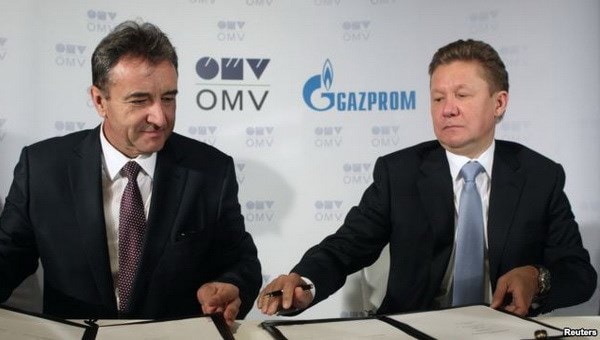Russia and Austria agree to implement the "South Stream" project
On June 24, Russian energy corporation Gazprom signed an agreement with Austrian gas and oil corporation OMV to build a branch of the South Stream gas pipeline on Austrian territory, despite opposition from the European Union (EU).
The document, signed by Gazprom CEO Aleksei Miller and OMV Director General Gerhard Roiss, defines the principles of joint work during the construction of South Stream on the territory of Austria.
 |
| Signing ceremony between Gazprom and OMV leaders. (Source: Reuters) |
Speaking at a press conference after the signing ceremony, Mr. Roiss said the cooperation decision was an investment in ensuring the security of gas supplies for Europe.
South Stream, a nearly $40 billion project, is designed to transport Russian gas to Central Europe, which depends on Moscow for a third of its gas needs.
It is expected that the gas pipeline section passing through Austria, nearly 50km long, with a transport capacity of up to 32 billion m3 of gas per year, will begin operating in late 2016 - early 2017. According to plan, this pipeline branch will reach maximum capacity in January 2018.
The agreement was signed during Russian President Vladimir Putin's visit to Austria, his second trip to the West since the outbreak of the Ukraine crisis.
Speaking after meeting with his Austrian counterpart Heinz Fischer, President Putin said the two sides shared the same views on the situation in Ukraine, but there were also issues that needed further discussion.
The Russian leader supported diplomatic solutions to the conflict in the neighboring country and called for a one-week extension of the ceasefire, proposed by Ukrainian President Petro Poroshenko, to facilitate dialogue between the authorities and the federalization protesters in the East.
Sharing the same view as the Russian President, the head of Austria Fischer said that President Poroshenko's seven-day ceasefire should be extended. He opposed sanctions against Moscow, saying that this was not an effective way to resolve the dispute, and called for more dialogue.
In addition, within the framework of his visit to Austria, the Russian President is expected to meet with other leaders of this country, as well as Chairman of the Organization for Security and Cooperation in Europe (OSCE) and President of Switzerland Didier Burkhalter.
EU member Austria has imposed visa bans and asset freezes on several Russian officials over the Ukraine crisis, but has so far refrained from imposing broader economic sanctions on Moscow./.
According to VNA






